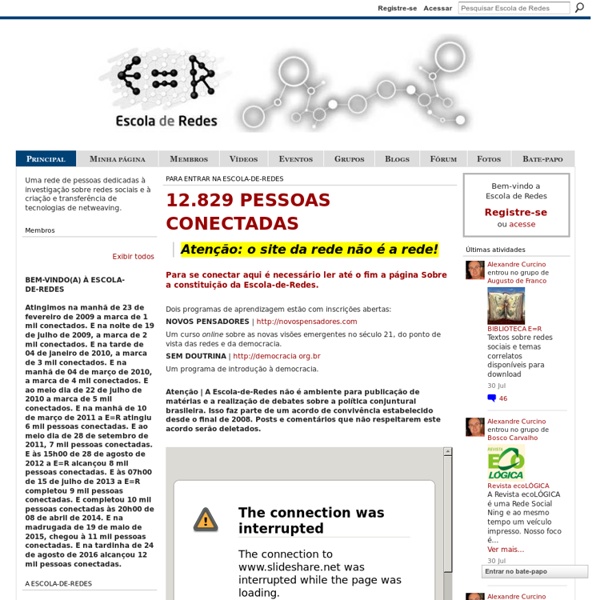



Top 10 Graphic Novels 2017 As the range of children’s graphic novels expands, authors are treading new ground and tackling different topics in imaginative ways. This year, our top 10 list includes Svetlana Chmakova’s Brave, a genuinely fresh take on bullying, and Melissa Jane Osborne and Veronica Fish’s The Wendy Project, in which a traumatic accident blurs the line between reality and fantasy for a teenage girl. Katie O’Neill’s The Tea Dragon Society has a traditional feel to it, but her tale of dragons who produce magical tea is totally original.
TRANSFORMATIONS Issue No. 14 March 2007 — Accidental Environments The Accidental Topology of Digital Culture: How the Network Becomes Viral By Tony Sampson Introduction: The Essence, the Event and the Accident In the 1990s a number of authors argued that the essential qualities of digital network culture were to be found in the militarised objectives of the cold war (Robins and Webster; Wise). freud quotes: About / Contact Founded in 2013, Freud Quotes is a blog and source for online education in a psychoanalytic field. We cover a lot of ground — psychoanalysis in its historical roots and contemporary context, news, events and of course daily dose of freudian memes. Also occasional bits of critical theory, arts & pop(culture. Contact Got a link we should post? Send it our way!
Alert! Alert! The information demands on the modern digital journalist are overwhelming and leading to burnout Journalists are overwhelmed by the information they process in their working day and want to explore solutions with third-party providers and management to make it more manageable. That’s the finding of a nine-month project involving discussions across the industry and a revealing in-depth survey. The research is part of the European Journalism Center’s News Impact Network, which held its latest summit yesterday in Berlin.
Publications Photo: Cordula Flegel These publications offer information about the Goethe-Institut and its activities. About the Goethe-Institut © Goethe-Institut Digital Text is Changing How Kids Read—Just Not in the Way That You Think Cognitive scientist Daniel T. Willingham said that digital devices aren’t changing the way kids read in terms of actual cognitive processes—putting together letters to make words, and words to make sentences. In fact, Willingham is quick to point out that in terms of “raw words,” kids are reading more now than they were a decade ago (thanks mostly to text messaging). But he does believe, as he writes in his book, The Reading Mind: A Cognitive Approach to Understanding How the Mind Reads, that kids’ reading habits are changing. And it’s reasonable to guess that digital technology, in all its three-second-video and Snapchat glory, is changing those habits.
The Best Exhibits to Visit for Free on Smithsonian Museum Day Don't miss these cultural hotspots, curated by WhereTraveler editors, that waive regular admission on September 21. September 21 is Smithsonian Museum Day. It's a chance for those exploring the nation's history, celestial bodies, European masters, decorative arts, pop culture—and many more pursuits—to visit the country's most impressive cultural institutions for free. Visit the Smithsonian's website to download complimentary admission for two, then present your tickets at the museum of your choice. 4 Ways Technology Can Make You Happier Source: Pixabay These days, you can’t go anywhere without hearing about how technology is ruining everything, including our happiness. There is some truth to this, but it’s not the whole story. Technology can be bad for us—for example, when social media gives us FOMO (fear of missing out) or traps us in filter bubbles that prevent us from seeing multiple points of view on important issues. As a society, we are increasingly concerned that technologies like smartphones and social media result in more social comparison, cyberbullying, and loneliness—all stumbling blocks to happiness. indeed, technology seems to be bad for our happiness when it interferes with the mental, social, emotional, and behavioral processes that contribute to well-being.
Why all children must learn code Across the world, the conversion of information into a digital format – also called “digitalisation” – has increased productivity in the public and private sectors. As a result, virtually every country in the world is working towards a digital economy. As this new economy evolves, special skills like computer programming are needed. POPSUGAR UK We need your consent to proceed We use cookies to personalize and enhance your experience on our site. Visit our Privacy Policy for more information on our data collection practices. By clicking Accept, you agree to our use of cookies for the purposes listed in our Cookie Consent Tool. To see a complete list of the companies that use these cookies and other technologies and to tell us whether they can be used on your device or not, access our Cookie Consent Tool. You will see this message only once, but you will always be able to set your preferences at any time in the Cookie Consent Tool.
Can we hope to understand how the Greeks saw their world? Homer used two adjectives to describe aspects of the colour blue: kuaneos, to denote a dark shade of blue merging into black; and glaukos, to describe a sort of ‘blue-grey’, notably used in Athena’s epithet glaukopis, her ‘grey-gleaming eyes’. He describes the sky as big, starry, or of iron or bronze (because of its solid fixity). The tints of a rough sea range from ‘whitish’ (polios) and ‘blue-grey’ (glaukos) to deep blue and almost black (kuaneos, melas). The sea in its calm expanse is said to be ‘pansy-like’ (ioeides), ‘wine-like’ (oinops), or purple (porphureos). But whether sea or sky, it is never just ‘blue’.